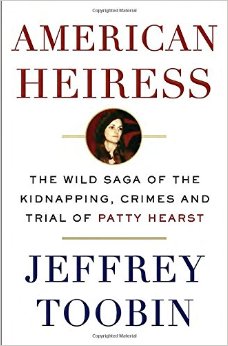American Heiress
American Heiress: The Wild Saga of the Kidnapping, Crimes, and Trial of Patty Hearst
By Jeffrey Toobin
Doubleday 2016
 Why, you ask, read a book about Patty Hearst, who was kidnapped in 1974 by a small group of criminals who styled themselves as revolutionaries; became a member of that revolutionary cell; participated in bank robberies, bombings, and many other crimes including the murder of an innocent woman who was trying to deposit the offering from her church in a bank; was eventually captured, tried, and convicted for some of her crimes; and then was pardoned by one President and eventually received executive clemency from another? It is indeed, as the subtitle of this excellent book suggests, a “wild saga,” but it’s old news.
Why, you ask, read a book about Patty Hearst, who was kidnapped in 1974 by a small group of criminals who styled themselves as revolutionaries; became a member of that revolutionary cell; participated in bank robberies, bombings, and many other crimes including the murder of an innocent woman who was trying to deposit the offering from her church in a bank; was eventually captured, tried, and convicted for some of her crimes; and then was pardoned by one President and eventually received executive clemency from another? It is indeed, as the subtitle of this excellent book suggests, a “wild saga,” but it’s old news.
There’s an argument to be made that the early days of 2017 are the right time to revisit the story of Patty Hearst. Jeffrey Toobin argues that the story of Patty Hearst is very much the story of the 1970’s in America. After the tumultuous decade of the 1960s — which saw social unrest over many issues, especially the war in Viet Nam and continuing civil rights struggles and disheartening assassinations of leaders but which also saw real gains in equal rights for African-Americans, good economic times, and national triumphs like a manned lunar landing — the 1970s were a sour decade marked by a stagnant economy, runaway inflation, the oil embargo resulting in long lines at gas stations, the Watergate scandal, and continuing anger over the war in Viet Nam.
Toobin argues that while there were protests in both decades, the protests in the 70s were different in character: in 1972 there were 1,962 bombings in America, resulting in 25 deaths; that number grew to 2,044 bombings by 1974, with 24 killed. The country seemed to many to be spiraling out of control, and the locus of much of the violence and violent rhetoric was the San Francisco Bay area, the home of the Hearst family.
I wonder whether we are at similar inflection point today in America, with a shift from optimism to pessimism, from a general sense that the country is headed in the right direction to polls showing that by a large margin Americans believe we are headed in the wrong direction. The sense of possibility sparked by the election of our first African-American president, by slowly improving economic conditions after the recession, and by the winding down of American engagement in wars in Iraq and Afghanistan, seems to have given way to pessimism caused by the summer of police shootings of African-American men, the carnage in Syria, continuing income inequality, and gridlock in Washington. The results of the presidential election of 2016 reflect a desire for some kind of change.
Toobin is not sympathetic to Patty Hearst and certainly not to the criminals who were getting nosebleeds on the moral high ground while they deluded themselves into thinking they were saving the country by robbing banks, blowing things up, and killing people. If this story has a hero it is Hearst’s father, who during his daughter’s captivity and later exploits as a “revolutionary” steadfastly loved her and actually broadened his view of the world and of society by immersing himself in the counter-culture in his attempts to free her and later to find her.
As for Patty Hearst herself, Toobin sees her as someone who “at each stage in her life . . . used the tools at her disposal.” That’s a nice way of saying that when kidnapped by revolutionaries she became one of them. After her capture, she turned on them, providing state’s evidence against them and embracing her former life of privilege. The last sentences of the book are devastating: “She did not turn into a revolutionary. She turned into her mother.”
This book is also a critique of how power and privilege worked in Patty Hearst’s favor. As Toobin points out, our jails are full of people who rob banks, fire automatic weapons on crowded streets, conspire to set off bombs, and so forth. But Patty Hearst is not in jail for those crimes, though she served a brief sentence. The resources of her family enabled her to evade accountability for her crimes.
Jeffrey Toobin tells a great story and contextualizes that story in American history in a way that makes this book much more than just the story of Patty Hearst.
I recommend it.
You must be logged in to post a comment.